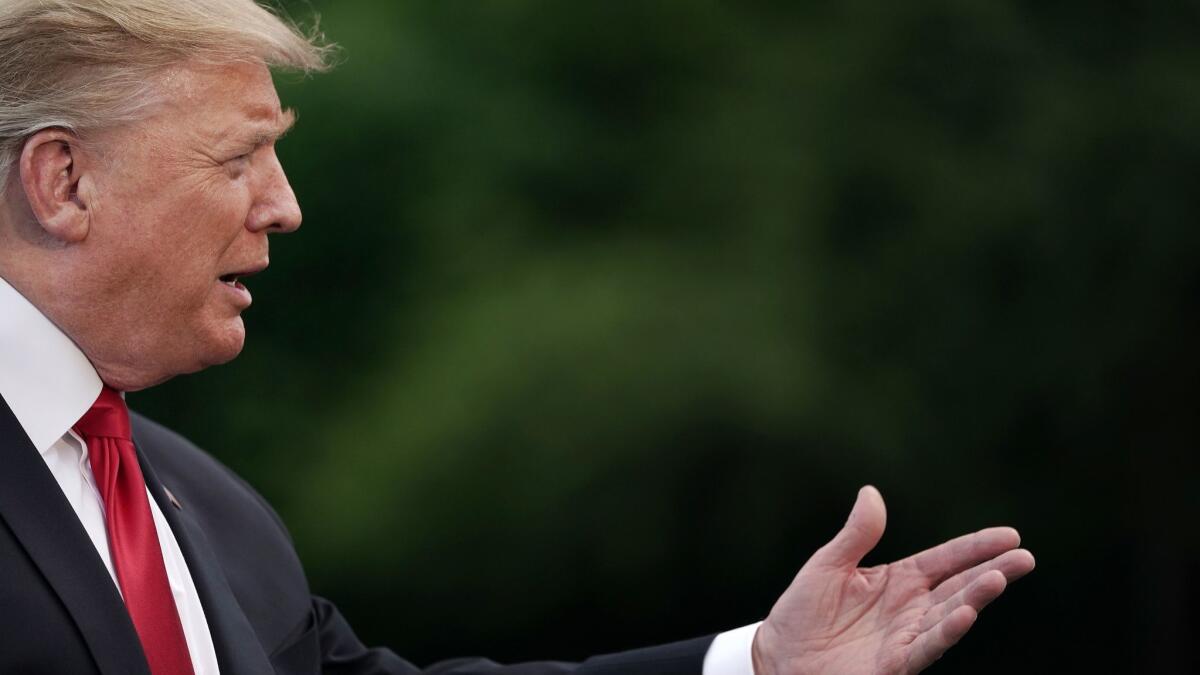Editorial: Trump’s mixed signals could lead to a clash with Iran

Apprehensions about an imminent military confrontation between Iran and the United States have subsided for the time being, after a tense period in which the Trump administration, citing heightened threats, sent an aircraft carrier and bombers to the region and the Pentagon reviewed contingency plans for war.
It now appears possible that Iranian actions that the administration interpreted as a preliminary to an attack on U.S. forces might in fact have been intended to thwart a feared U.S. attack. Iran’s supreme leader, Ayatollah Ali Khamenei, has now said that “no one is seeking war,” while President Trump has suggested that Iranian leaders “call me” so that negotiations could begin on a diplomatic deal involving nuclear and other issues.
Such a grand deal seems awfully unlikely at the moment. But at least the chances that ignorant armies — or in this case navies — will clash by night have been reduced for the time being.
Yet any sense of relief must be tempered by several troubling realities.
One is that the Trump administration continues to speak and act as if its goal wasn’t just to deter or punish destabilizing activities by Iran but to encourage “regime change,” diplomatic parlance for the overthrow of the Islamic Republic. That’s no recipe for diplomatic rapprochement.
The president seems to believe that his diplomacy with North Korea is a template for a diplomatic breakthrough with Iran.
A second concern is that, as in other areas of foreign policy, Trump and his most senior advisors might not be on the same page, creating confusion not only for Iran but also for U.S. allies. As Times columnist Doyle McManus recently noted, Trump and national security advisor John Bolton have sent conflicting signals not only on policy toward Iran but also on the future of U.S. troops in Syria and negotiations with North Korea over ending that country’s nuclear-weapons program.
The president seems to believe that his diplomacy with North Korea is a template for a diplomatic breakthrough with Iran. The notion is that, just as he established a cordial relationship with Kim Jong Un after threatening North Korea with “fire and fury,” he might also make a grand deal with Iran (even after tweeting over the weekend that an attack by Iran on the U.S. would mean “the official end of Iran”).
The problem, of course, is that Trump’s courtship of Kim, while it may have reduced tensions, hasn’t led to the “rapid denuclearization” that is supposed to be the objective. Moreover, the U.S. has suggested that it doesn’t seek to depose Kim in North Korea — while sending signals to the government in Tehran that its ouster might indeed be the goal.
Not only has Trump repudiated the international agreement under which Iran agreed to significant limitations on its nuclear program — an agreement with which Iran largely has complied — but the U.S. has also imposed sanctions that will make it harder for other signatories of the agreement, including America’s European allies, to live up to their obligations.
Enter the Fray: First takes on the news of the minute »
Finally, the U.S. has demanded as a condition of any new agreement that Iran comply with 12 demands. Some deal with its nuclear program, directly or indirectly, but others target Iran’s foreign policy, including its relationship with Shiite militias in Iraq and its support for militant groups such as Hezbollah and Hamas.
In a speech last year, Secretary of State Michael R. Pompeo described these as “basic requirements” for any agreement between the U.S. and Iran. Some of the demands are responses to destabilizing activities by Iran that the U.S. and its allies are absolutely right to condemn and challenge. But it’s not surprising that Iran might see in the U.S. demands a series of ultimatums, not talking points for future negotiations. And it can hardly be lost on Iran that the Trump administration is more forgiving of destabilizing activities by its ally Saudi Arabia, such as that kingdom’s bloody activities in Yemen’s civil war.
A perception by Iran that the U.S. regards it as illegitimate inevitably will color perceptions of U.S. words and actions. If Trump is serious about his request that Iranian leaders call him and reopen negotiations, he and his advisors need to clarify that they seek to influence the behavior of Iran’s government, not overthrow it.
Follow the Opinion section on Twitter @latimesopinionand Facebook
More to Read
A cure for the common opinion
Get thought-provoking perspectives with our weekly newsletter.
You may occasionally receive promotional content from the Los Angeles Times.






